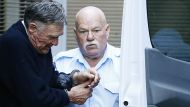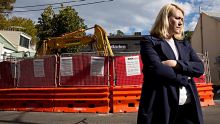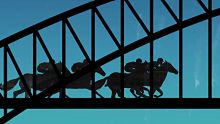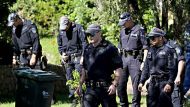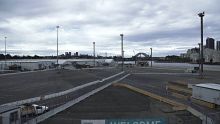It was a brutal killing. Almost three years ago, 79-year-old farmer Ian Turnbull shot dead state environment officer Glen Turner on a country road near Moree in north-western NSW.
Turner and colleague Robert Strange had pulled over to take photos of piles of fallen trees on fire in a field owned by Turnbull, whose family had been previously prosecuted for illegal land clearing.
More NSW News Videos
Ian Turnbull jailed for 35 years
The farmer who was accused of killing environmental officer Glen Turner near Moree is convicted of murder and sentenced to 35 years jail. Courtesy ABC News 24.
When the farmer arrived in his ute with a rifle, he shot Turner in the chin without warning. As the 51-year-old went down then staggered back to his feet, Turnbull shot him again in the shoulder.
For more than 20 minutes, Turnbull menaced Turner and Strange as they crouched behind their vehicle, setting off an emergency beacon and ringing 000 to get help.
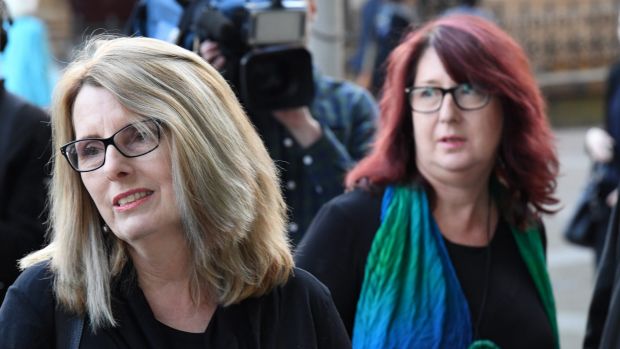
When the environment officer ran for cover in nearby trees, Turnbull shot him in the back and left him to die.
Convicted of murder and sentenced to a maximum 35 years in jail, the patriarch of a family of grain farmers whose land holdings cover more than 4000 hectares died in custody at the age of 82 last month.
As soon as the murder hit the headlines, it fascinated film-maker Gregory Miller, whose credits include environmentally themed documentaries on climate change (Cool School Antarctica) and China (New Beijing: Reinventing A City).
"I went up to Moree and did research," Miller says. "And as soon as I got up there, it was like touching a raw nerve.

"Everyone was totally on edge. Everyone you spoke to had an opinion. Even though the murder took place 40 kilometres outside Moree, in a little town called Croppa Creek, everyone was connected."
Miller has now finished the documentary Cultivating Murder, which looks at the consequences of the killing and the tensions between farmers and environmentalists over land clearing for large-scale cropping. It starts a series of screenings around the country on April 20.

"We thought we were making a film about a poor farmer who had been driven to the edge but as things went on it became very clear that wasn't the case," Miller says. "The evidence showed he was not a poor farmer to start off with; he was rich.
"He wasn't unduly under financial stress as a result of the Office of Environment and Heritage investigating him. And the court decided that he wasn't suffering from any mental illness.

"It was a businessman trying to make a point – a public statement for a number of powerful business interests in the area, of which his family was one, that they were not to be pushed around.
"They had a sense of entitlement about their business operations. They thought 'I bought this land freehold and people shouldn't be coming and telling me how I should be running it'."

Miller goes as far as describing Turner's death as a political murder.
"It was a strike at the government, a bold statement, and also a personal vendetta," he says.
Cultivating Murder shows Turner's partner, Alison McKenzie, daughter Alexandra, son Jack and sister Fran Pearce struggling to deal with his death.
"Some days are just quite normal," McKenzie says of life with her children. "Other days they'll get very, very sad. It could be that they've got something on at school or just something that they want to show their dad. All I can do is hug them and tell them that their dad would be proud of them."
She agreed to be in the documentary because "she doesn't want Glen's memory to be lost", Miller says. "She believes the circumstances around the murder are still not fully known. For her, it was an assassination."
The film also shows the environmental damage that land-clearing has caused in the area, including the destruction of koala habitats.
"Koalas all over the east coast of Australia are under massive threat," Miller says. "It's bizarre that we're not just killing off the Great Barrier Reef, we're killing off our iconic native animals."
A phone conversation by Turnbull that was recorded from prison gives his perspective. "How are we going with the bloody thing as far as fighting these bastards and paying the bloody fines and whatnot?," he says to a family member. "The main thing is to get the bloody EP and H off our bloody back so the boys can go ahead and farm."
Outside the court, the film shows Turnbull's son Grant calling for changes to the Native Vegetation Act, which covered land clearing in the state at the time of the murder.
"The politicians need to listen," he says. "It's not just my father. It's many people out in rural NSW that are extremely frustrated ... with the way it's administered and the act itself."
While it is not mentioned in the documentary, a judge in the Land and Environment Court ordered Grant Turnbull to carry out repairs worth $4.5 million last year for illegally clearing 508 hectares of land.
Cultivating Murder raises questions about the impact from the state government's review of its environmental legislation, with the Native Vegetation Act replaced by the Biodiversity Conservation Act, following a push by the Nationals and the Shooters and Fishers Party for greater land-owner rights to clear land.
"There's a small group of land developers and wealthy farmers in the area of which Turnbull was one," Miller says. "They pushed the agenda to get the law changed because it doesn't suit their business model to preserve the environment in any way. It suits their business model to have complete carte blanche."
Miller believes the threat to the rural environment has increased because the new legislation was rushed and badly written.
"Similar acts in Queensland have led to a great increase in clearing and in NSW we're starting to hear of reports but it's not being investigated," he says.
"There's very little land left out there to maintain species, to maintain bio-diversity of any sort."
As he made Cultivating Murder, Miller sat in the court most days during the eight-week trial.
He believes the murder was triggered when Turnbull was caught red-handed clearing protected land even while being investigated.
"The photographs show that," he says. "They show piles of timber on fire. [Turnbull] decided that this was the moment he was going to act.
"Two years earlier, he had threatened to shoot Glen. He said 'what can they do to me? I'm an old man. If I do it, I'll be out on bail, it'll take a long time for the court case, I'll probably be dead by then.'
"So he'd worked it out. He was up for it."
Miller hopes the documentary will contribute to tougher legislation to restrict land clearing around the country.
"I think that's what Glen would have liked," he says. "The film is very much dedicated to Glen. He didn't just work for the Office of the Environment and Heritage, he was very concerned about the environment.
"He owned a beautiful property outside Tamworth and he planted a thousand trees on it. He believed in what he was doing."
Cultivating Murder's national screenings include Sydney's Chauvel cinema on April 20 and Melbourne's Australian Centre for the Moving Image on May 13.


